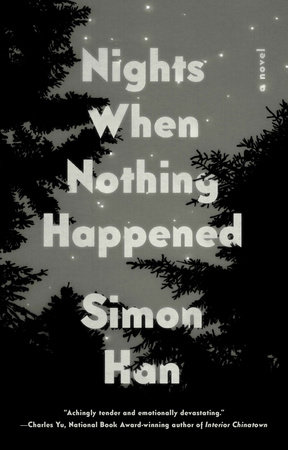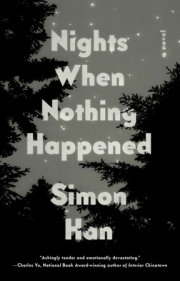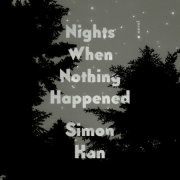Nights When Nothing Happened
Late August and early September were the long days of learning. The locker-lined walls of Fillmore Middle School penned Jack in, while his sister’s school, Plano Star Care, shuttled its students on field trips ambitious even for the gifted. During her third week of kindergarten, after a visit to the JFK assassination museum, Annabel used a word she’d never used before: fascinating. “They got video,” she told their mother as the two of them sat at the kitchen table, tearing the ends off green beans. “Fascinating.”
In the adjoining living room, the TV in front of Jack announced the latest scandal in the Catholic Church. Numbers were thrown out. Twelve. Eighty-four. Five hundred and fifty-two. These were scary numbers, the steely eyed commentator stated. Before the commercial break, she promised that they would return to the war coverage.
“He was in the car,” Annabel said. “And the car had no roof. And his head went blam! Like when Daddy dropped the watermelon. Me and Elsie watched fourteen times.”
“Háizi!” his mother said. “Where were your teachers?”
“Around,” Annabel said. “And then we went to the Grassy Knoll. That’s where the video happened. Elsie told me she saw blood on the road.”
Elsie was Annabel’s new best friend. A day earlier, his sister had boasted about Elsie’s dream to hurl herself from the monkey bars so she could break her arm and get a cast littered with drawings and signatures. His mother shushed her now as she’d shushed her then, but Annabel pressed on. “The head,” she said, “the head went blam-blam-blam. All the way to China! Blam!” She snapped the green beans in half—blam!—then in fourths—blam!
“Stop!” his mother said, but Jack didn’t know if she was talking about the JFK story or the green beans. “Stop—wǒde mā ya—stop!”
Jack turned around from the couch: his father was draping a giant forearm around Annabel’s neck. He had Jack’s sister pinned against the chair, his forearm pressing down on her throat as Annabel’s hands flailed in the air. His father grinned and Annabel laughed and his mother laughed and the TV commercial behind Jack laughed, too. He should have laughed, laughed at the silly game his father and sister liked to play.
His father brought his arm back to his side. He scratched his ass with his oven mitt. At his photography studio he slung around long-nosed cameras heavier than babies, while at home he sported an apron of Monet’s water lilies, nearly small enough to serve as a bib. When he smiled he shut his eyes, lost in some distant pleasant thought. His mother laughed when she was happy and frowned when she was upset, but in the five years Jack had known his father, mannequin’s faces had proven easier to read.
“You got to be scarier!” Annabel said. “It’s in the eyes, Daddy!” She stood up on her chair and, without warning, socked his father’s belly. For every action, Jack had learned, there is an equal and opposite reaction. What would it feel like to punch his father in the stomach? When Annabel tired of punching, she plopped back down with the flair of a wounded TV wrestler and plucked the end off a green bean. His mother told her not to put it in her mouth. His father returned to the kitchen, cracking his back on the way. His game was a success. For the time being, Annabel had forgotten about John F. Kennedy’s head.
At Jack’s school the next day, his safety was not a game. Preparing for a potential intruder was no laughing matter. Lock the classroom door. Close the blinds. Turn off the lights. Coach Becker, his health teacher and a demonstrative door locker, twisted the switch as if in slow motion, which led to a resounding, foreboding click. “Push the desks against the door,” Coach Becker said. “Sit in the corner. Now.” When Marco Martinez tittered, Coach Becker ordered him out into the open center of the classroom, to do thirty-five push-ups. Jack looked on with the rest of the class without saying a word. Marco lived across the street and had beaten Jack in sixteen straight games of Clue, but when it came to push-ups there was no need to count. The boy weighed nearly two Jacks and couldn’t get his hips off the ground. He heaved. His eyes, pooled with sweat, implored Coach Becker for mercy. Kill me, he must have been thinking. I want to die! It was better that Marco wasn’t allowed to say it.
When he got home, Jack told Annabel about the drill. “Guess what? We practiced hiding from school shooters. Marco Martinez barfed.” She ate his stories up, with the serious fascination children reserve for adults crying in public, or animals mating. “Oh, I never saw a real shooter,” she said.
“That’s enough,” their father said, herding them to the refrigerator for ice cream.
Annabel refused to sleep by herself again that night. To release herself to sleep was to allow Māma and Daddy to abandon her to a dark and dangerous world. One parent tucking her in was no longer enough. Her wailing reminded Jack of his first months in America, when his father’s nightmares had kept him awake. They lived in a one-bedroom in East Plano then, an apartment half the size of his grandparents’. Think of it like another plane ride, his mother told him. A means to an end, not a place to call home. But from the mattress in the living room, Jack could spy, past the bent plastic of a window blind, switchgrass taller than him. Beyond that, the illuminated sign of a dry cleaner that had been in business for more years than he’d been alive. There was a story in the loose spring by his foot, the stain under one corner of the mattress. A chapter he was living, even as his parents prepared for the next one. When his father sometimes yelled out from his parents’ bedroom in the middle of the night, he did not utter a word, in any language, that Jack could understand. He could only hear his mother on the other side of the door, pleading for him to stop.
Now Jack left the door to his room open and listened as his mother assured Annabel, the way she’d assured Jack in those first months, that there was nothing to see. Nothing under Annabel’s bed, nothing in the closet, nothing in the mirror, nothing in Daddy’s hands, nothing in Daddy’s head. Annabel pecked a cheek that was nothing more than a surface for her lips to touch. She took a gulp of nothing air. When she finally stopped crying, there was no sound of footsteps shuffling back downstairs. No reason for his parents to take their leave. The only way Jack could imagine their bodies fitting on his sister’s bed was with his mother’s elbows prodding Annabel and half of his father’s body splayed over the side.
Copyright © 2020 by Simon Han. All rights reserved. No part of this excerpt may be reproduced or reprinted without permission in writing from the publisher.










